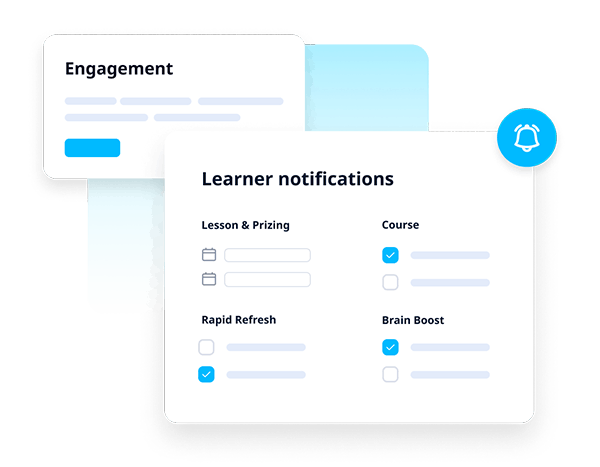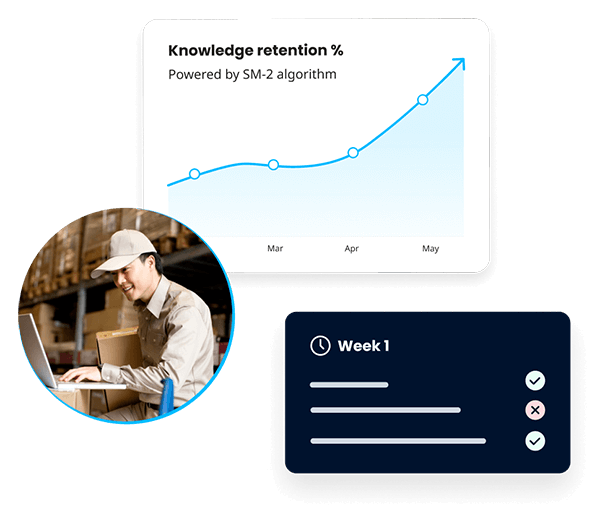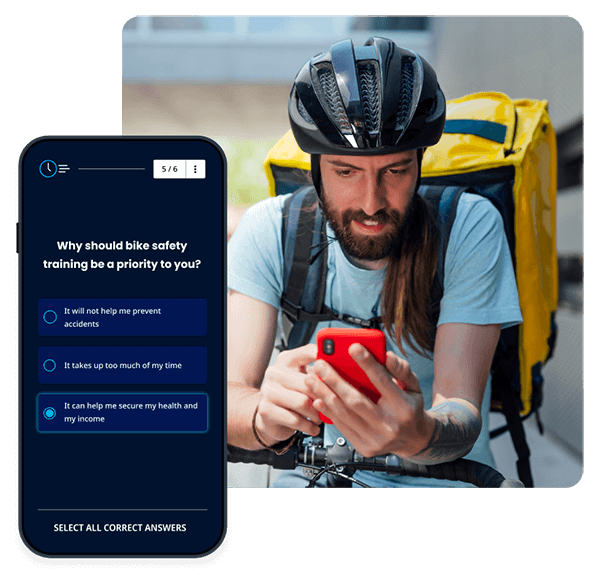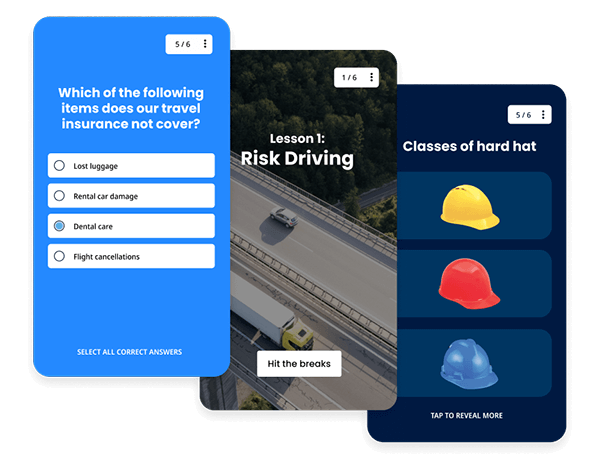How the concept of nudges can be applied to online learning tools

You know that annoying ‘elbow in the side’ someone gives you to remind you to do something? That’s a nudge. In this article, we are going to explore the nudge theory and learning tools. In other words, how we can gently ‘elbow’ our learners into increasing their knowledge retention?
Why do learners need nudges?
As we get older, our prospective memory weakens, so it is more difficult to remember that something needs to be done and exactly what that ‘something’ is.
Nudges can help your trainees with task-oriented items such as registering for needed training; finishing an online training course on time; or submitting required documentation.
Another reason for nudges is that over time, people forget what they have learned. Education tends to be linear. In other words, learners complete a course and that’s it. It is assumed that they have retained their knowledge or skills. Yet, people forget. Research shows that the “rate of forgetting is independent of initial degree of learning”. In other words, people tend to forget at the same speed or level no matter how well they learned the material.
Nudges can refresh people’s memories and increase long-term retention.
Nudge suggestions for online learners
Task-oriented nudges
A nudge app or a nudge software, such as a learning management system (LMS) is one of the ways that nudge theory and learning tools combine to help your trainees keep on track. For example, the Ed App LMS offers a learner portal. Through this portal, your learners can receive push notifications. This feature not only allows you to send custom notifications to your learners’ smartphones, but also sends automated reminders, so they’re more likely to complete their lessons.

Push notifications are an effective tool for helping people focus. The notifications cut through life’s distractions, reminding people that they have an intention that needs to be carried out. They also clarify what that ‘something’ is, in case the person does not remember.
Retention-oriented nudges
An LMS can have features which help learners remember more of what they are learning and also jog their memory at future intervals. Let’s look at several which are available with EdApp.
Brain Boost Spaced Repetition
During a training course, the EdApp Brain Boost spaced repetition feature uses the SM-2 algorithm to automatically repeat key content until your learner gets it. No additional content creation required. The result is that trainees tend to retain more of the course material.

Rapid Refresh
Creating quizzes can be time-consuming. However, they are great ways to check where your employees are at with their training, where the gaps are, and which material does not need to be taught further at this point. EdApp offers an in-built quiz maker to reinforce new concepts, collect feedback, and identify knowledge gaps quickly.

Obviously, Rapid Refresh quizzes are a highly useful tool during training. In addition, they are also excellent after. Quizzes at regular intervals in the future continue to give you feedback about who remembers what. Then, you are well placed to fill in the gaps with refresher training as needed.
Microlearning
Over time, memory fades. Even learners who were outstanding during the training course will forget some of what they have learned. This can be made worse when employees do not use all their learned knowledge on a frequent basis.

Obviously, it would be very boring and time-consuming to have employees re-take all their training modules. The solution is short doses of learning for just a few minutes every day. By delivering highly targeted lessons to your teams regularly, learners can quickly review material learned.
A common response to nudges
There is some data to suggest that people may feel threatened by nudges. This is because they feel that being nudged interferes with their autonomy (independence) and freedom of choice. Researchers into nudge theory and learning tools recommend that trainers and educators need to be aware of this possible resistance.
Why would people feel threatened?
Frequent task-oriented reminders are a way to influence a person’s behavior. In other words, to persuade someone to do what we want them to do. In some ways, it is as if we do not respect their decisions: to not register for training; to miss deadlines; to fail to turn in needed documents. It could even be seen as nagging.
With respect to retention-oriented nudges, the resistance is less. People tend to accept that refreshing their knowledge is a positive thing.
How can organizations overcome nudge resistance?
First, start positive: The data shows that when people have a negative attitude towards something, nudging is much less effective. For example, nudges that reminded people to wear their employee badges were not very effective because many employees did not want to wear their badges in the first place.
To increase the effectiveness of nudges, it is recommended to start from a place where most of your workers are on board with what needs to be done. Here is where transparency comes in.
Now, become transparent: Getting your employees on board is not as challenging as you might think. When people feel they are a significant part of a program, they tend to be more accepting of what needs to be done to ensure success.
You can begin by explaining to people how important the goal is (task, training, etc.), and back it up with proof (data, statistics). Be honest that you need their cooperation in order for good success (you do). Discuss any resistance they have, and do your best to compromise wherever possible.
A transparent approach does not make you look weak; it makes you look human, and most of your people will respond well to that.
Check out EdApp and start nudging your learners to complete their training!
Sources:
https://www.frontiersin.org/articles/10.3389/fpsyg.2022.905860/full
https://www.ncbi.nlm.nih.gov/pmc/articles/PMC7759476/
https://link.springer.com/article/10.1007/s10212-020-00495-0
https://link.springer.com/article/10.3758/s13421-021-01271-1
https://www.tandfonline.com/doi/full/10.1080/01973533.2021.1917412
Author
Guest Author Lisa Aharon
Lisa Aharon is a guest author at EdApp, offering varied experience as a computer programmer/analyst, technical writer, secretary/bookkeeper, copy editor, creative writer, and English teacher.
